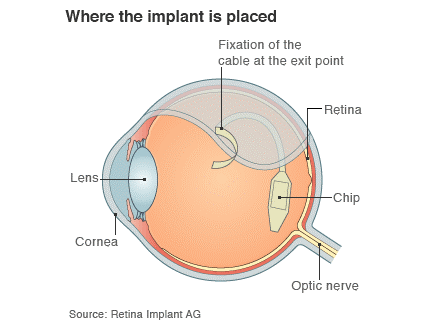New electronic implant tech lets blind see
Offers ability to detect objects, letters and people

A new electronic implant technology allows blind people to detect objects and identify the letters of the alphabet or the time on a clock face.
The major breakthrough in optical tech has been detailed in this month's journal Proceedings of the Royal Society B.
Solution to hereditary blindness?
Researchers in Germany and the US have been testing electronic implants to help blind people suffering from retinal dystrophy – a hereditary or age-related condition which causes degeneration of the photoreceptors in the retina.
The problem affects around 15 million people worldwide.
Eberthart Zrenner and his team at the University of Tübingen in Germany developed a microchip with 1,500 photosensitive diodes that slides into the retina in place of the natural photoreceptors.
One Finnish man, 46-year-old Miikka Terho, who suffers from this inherited form of blindness has now been able to identify letters and the time on a clock face using the implant tech.
Get daily insight, inspiration and deals in your inbox
Sign up for breaking news, reviews, opinion, top tech deals, and more.
Mr Terho was also able to recognise cutlery, a mug on a table and tell the difference between seven different shades of grey.
"Three or four days after the implantation, when everything was healed, I was like wow, there's activity," Terho told the BBC.
"Right after that, if my eye hit the light, then I was able to see flashes, some activity which I hadn't had.
"Then day after day when we started working with it, practising, then I started seeing better and better all the time.
"Even having a limited ability to see with the chip, it will be good for orientation, either walking somewhere or being able to see that something is before you even if you don't see all the tiny details of the object."
Via Proceedings of the Royal Society B, New Scientist and BBC News
